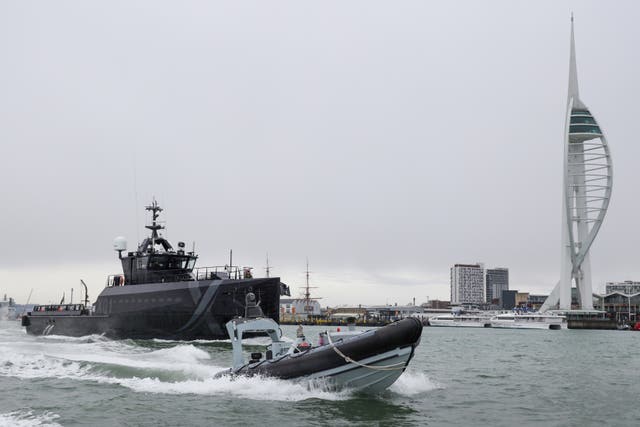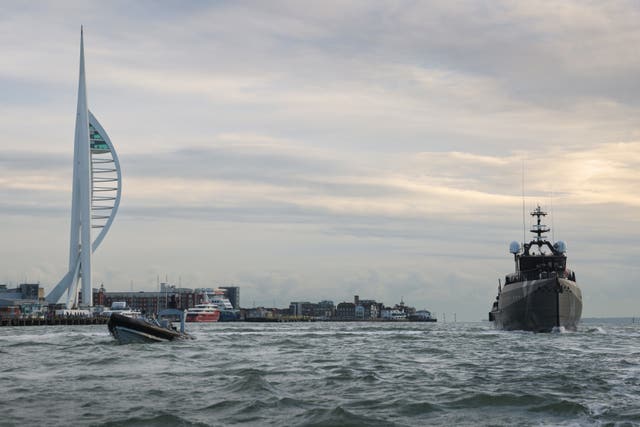
A drone boat which could be deployed by the Royal Navy on reconnaissance and defence missions without endangering the lives of sailors has been operated remotely for the first time in UK waters.
The Pacific 24 rigid inflatable boat (Rib), which is normally used to intercept drug-runners and take sailors ashore, was tested without a crew in Portsmouth Harbour following successful trials overseas.
It was controlled both autonomously and remotely from the Navy’s experimental ship XV Patrick Blackett off the Hampshire coast.

A Royal Navy spokesman said: “The week-long trials pushed the uncrewed vessel to its limits with rough seas and even snow, testing its systems and software in a range of operational scenarios.
“The autonomous tests saw it pre-programmed to follow certain manoeuvres and directions while the remotely piloted tests saw it controlled by a Royal Marine using a console on board the ship.”
The spokesman explained that the Autonomous Pacific (Apac) boats could be deployed to carry out reconnaissance missions as well as to launch weapons and provide protection against threats while minimising the risk to sailors.
He said: “With cameras and sensors on board, the robot Rib fed back a live camera feed to control units and computers on XV Patrick Blackett, which could then be analysed.
“Other sensors and weapons could be added to further enhance its use as a vessel for intelligence, surveillance and reconnaissance operations with data fed back in real-time.”

Commander Michael Hutchinson, commanding officer of XV Patrick Blackett and head of experimentation of NavyX, the Navy’s team of autonomous experts, said: “Integrating crewed and uncrewed systems and operating them at the same time is a huge step forward for the Royal Navy.
“This is the first time a fully autonomous and crewless boat has been operated in UK waters and we have achieved this throughout the week in different conditions and completing a range of tests.
“It forms the backbone for further integration that future ships will have with autonomous technology.
“The trials and experiments we do will develop the standard operating procedures for the APAC and how to use uncrewed systems effectively for warfighting.”


Why are you making commenting on The National only available to subscribers?
We know there are thousands of National readers who want to debate, argue and go back and forth in the comments section of our stories. We’ve got the most informed readers in Scotland, asking each other the big questions about the future of our country.
Unfortunately, though, these important debates are being spoiled by a vocal minority of trolls who aren’t really interested in the issues, try to derail the conversations, register under fake names, and post vile abuse.
So that’s why we’ve decided to make the ability to comment only available to our paying subscribers. That way, all the trolls who post abuse on our website will have to pay if they want to join the debate – and risk a permanent ban from the account that they subscribe with.
The conversation will go back to what it should be about – people who care passionately about the issues, but disagree constructively on what we should do about them. Let’s get that debate started!
Callum Baird, Editor of The National
Comments: Our rules
We want our comments to be a lively and valuable part of our community - a place where readers can debate and engage with the most important local issues. The ability to comment on our stories is a privilege, not a right, however, and that privilege may be withdrawn if it is abused or misused.
Please report any comments that break our rules.
Read the rules here